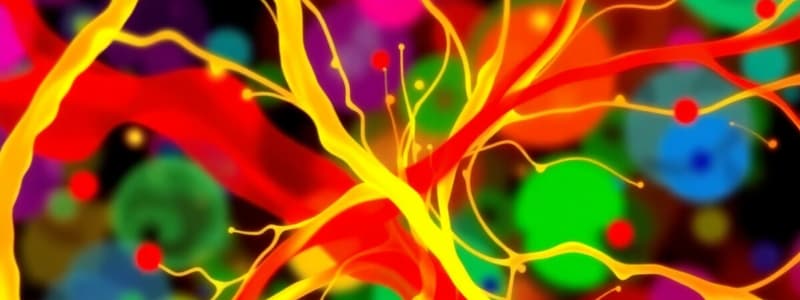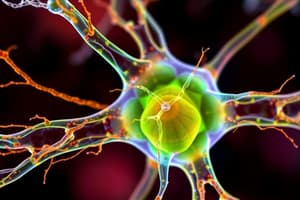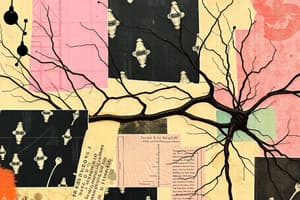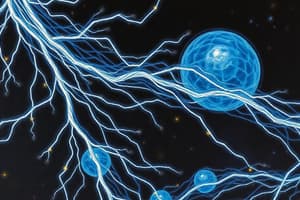Podcast
Questions and Answers
What is the primary mechanism of action of colchicine in treating acute gouty arthritis?
What is the primary mechanism of action of colchicine in treating acute gouty arthritis?
- Enhancing the movement of organelles along microtubules
- Binding to tubulin to prevent microtubule polymerization (correct)
- Inhibiting the formation of microfilaments
- Promoting leukocyte migration and phagocytosis
Which family of motor proteins moves vesicles toward the minus end of microtubules?
Which family of motor proteins moves vesicles toward the minus end of microtubules?
- Kinesin
- Dynein (correct)
- Actin filaments
- Tubulin
What structural feature distinguishes centrioles from other microtubule-associated structures?
What structural feature distinguishes centrioles from other microtubule-associated structures?
- Formed during cytokinesis
- Composed of microfilaments
- Involved in phagocytosis
- Consist of nine microtubule triplets (correct)
Which function is NOT attributed to microtubule-associated proteins (MAPs)?
Which function is NOT attributed to microtubule-associated proteins (MAPs)?
During cell division, what critical role do centrioles play?
During cell division, what critical role do centrioles play?
What drives the movement of kinesin along microtubules?
What drives the movement of kinesin along microtubules?
Which of the following statements about actin filaments is incorrect?
Which of the following statements about actin filaments is incorrect?
What is the role of the centrosome in relation to microtubules?
What is the role of the centrosome in relation to microtubules?
Which statement accurately describes the dynamics of microtubules?
Which statement accurately describes the dynamics of microtubules?
What is the primary role of the centrosome in relation to microtubules?
What is the primary role of the centrosome in relation to microtubules?
How do microtubules contribute to intracellular movement?
How do microtubules contribute to intracellular movement?
Which of the following correctly describes the structural composition of microtubules?
Which of the following correctly describes the structural composition of microtubules?
What critical role do microtubules play during cell division?
What critical role do microtubules play during cell division?
What is one of the effects of microtubules' dynamic nature?
What is one of the effects of microtubules' dynamic nature?
In what way do microtubules support ciliary and flagellar motion?
In what way do microtubules support ciliary and flagellar motion?
Why are microtubules considered important targets for drug action?
Why are microtubules considered important targets for drug action?
Flashcards
Colchicine's effect on microtubules
Colchicine's effect on microtubules
Colchicine prevents tubulin polymerization into microtubules, disrupting leukocyte migration, phagocytosis, and inflammatory mediator release.
Microtubule-associated proteins (MAPs)
Microtubule-associated proteins (MAPs)
Motor proteins assisting in organelle and vesicle transport within the cell. They prevent microtubule depolymerization.
Dynein's function
Dynein's function
A microtubule motor protein that moves vesicles towards the minus end of a microtubule, using energy from ATP.
Kinesin's function
Kinesin's function
Signup and view all the flashcards
Centrioles
Centrioles
Signup and view all the flashcards
Centrosome function
Centrosome function
Signup and view all the flashcards
Actin filaments (microfilaments)
Actin filaments (microfilaments)
Signup and view all the flashcards
Gouty arthritis
Gouty arthritis
Signup and view all the flashcards
Microtubules (MTs)
Microtubules (MTs)
Signup and view all the flashcards
Centrosome
Centrosome
Signup and view all the flashcards
Microtubule Dynamics
Microtubule Dynamics
Signup and view all the flashcards
Tubulin
Tubulin
Signup and view all the flashcards
Protofilaments
Protofilaments
Signup and view all the flashcards
MT Functions
MT Functions
Signup and view all the flashcards
Cytoskeleton
Cytoskeleton
Signup and view all the flashcards
Microfilaments
Microfilaments
Signup and view all the flashcards
Study Notes
Cytoskeletal Microtubules & Microfilaments & Motility
- Students will be able to correlate the molecular organization of microtubules to their dynamic nature, interpret structural adaptations of microtubules (MTs) to their function, correlate motor proteins in cell trafficking to MTs, appraise the importance of microtubules as a drug target, and correlate the molecular structure of actin to its function.
Cytoskeleton
- The cytoplasm of animal cells contains a complex three-dimensional protein filament network (cytoskeleton) maintaining cell shape.
- The cytoskeleton is active in cell and organelle movement.
- It has three components: microfilaments, intermediate filaments, and microtubules.
Microtubules
- Microtubules (MTs) are long, hollow structures acting as intracellular pathways.
- Centrosomes, near the nucleus, contain y-tubulin ring complexes that nucleate microtubules.
- Microtubules are dynamic, frequently changing length by growing and shrinking at the plus end (away from nucleus). The average half-life is about 10 minutes.
- Each microtubule consists of 13 parallel protofilaments made of a- and b-tubulin heterodimers.
Functions of MTs
- Provide cell shape rigidity and maintain structure.
- Regulate organelle and vesicle movement.
- Form the basis of cilia and flagella.
- Create intracellular compartments.
- Essential for cell division (mitotic spindle).
Clinical Correlation
- Drugs like colchicine can disrupt microtubule formation, affecting leukocyte function (migration, phagocytosis) and having anti-inflammatory effects (e.g., acute gouty arthritis).
Microtubule-Associated Proteins
- Motor proteins (e.g., kinesin and dynein) move organelles and vesicles along microtubules.
- Kinesin moves toward the plus end, and dynein moves toward the minus end, both driven by ATP.
Centrioles
- Centrioles are small cylindrical structures (nine triplets) forming the microtubule organizing center (or centrosome).
- They are perpendicular to each other.
- Centrioles are important in cell division by forming the spindle apparatus, also forming cilia and flagella.
Actin Filaments (Microfilaments)
- Thin filaments (microfilaments) are composed of two intertwined chains of globular actin (G-actin).
- These form a filamentous protein (F-actin).
- Filaments have a plus and minus end with different growth rates.
Functional Forms of Actin
- Contractile Bundles: Loosely parallel bundles for cytokinesis, movement of organelles, and vesicles.
- Gel-Like Networks: Structural basis for the cell cortex.
- Bundles: Form the core of microvilli.
- Focal Points/Focal Adhesions: Cell-matrix contact points.
Studying That Suits You
Use AI to generate personalized quizzes and flashcards to suit your learning preferences.




